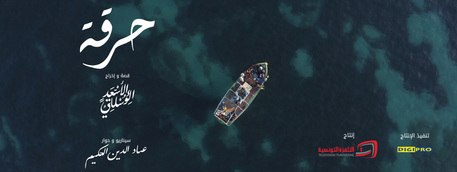(ANSA) - TUNIS, 20 APR - A new TV series called 'Harga', by
director Lassaâd Oueslati, is one of the many being broadcast in
Tunisia during the holy month of Ramadan, when families gather
around the TV after breaking the daily fast.
The series deals with a topic not often seen in Tunisian TV
shows, that of the social drama of clandestine migration.
Oftentimes these TV series allow for understanding the vices and
virtues of Tunisian society much better than through an
analysis.
Written by Imed Eddine Hakim, Harga tells the story of a group
of Tunisians from different parts of the country who don't know
each other and for various reasons are forced to illegally
migrate to Italy in search of a better future.
The title Harga evokes the Arab term "to burn", in the sense of
burning documents, that is, crossing borders secretly, and it
also alludes to shipwreck.
Writing for French daily La Presse, journalist Hafedh Trabelsi
said the show, with a high-quality production staff and a cast
that brings together emerging and established actors, "breaks
down preconceptions on one of the most deadly and tragic social
issues that Tunisian society knows: young people and citizens of
all social classes throwing themselves silently into the
unknown, challenging the sea and difficulties in hard
conditions, to reach the other shore, the falsely imagined
Eldorado of Europe, and more precisely, Italy".
"Trajectories often missed and trips often missed in advance,
which remain unfinished and that rhyme with death, repatriation,
and detention in reception centers", Trabelsi said.
"It is a problem that is devouring Tunisian society and its
fallen young people, left to fend for themselves, faced from the
start with unemployment and poverty, dreaming of calmer skies
and nations that provide them with a minimum of assurance for
living, fruitful work, a status, security. They are Tunisians,
but also sub-Saharan refugees who arrived illegally in Tunisia
and are fleeing wars and terrorism in sub-Saharan African
countries," he said.
The 20-episode series was supposed to be filmed between the two
shores, one-third at sea, with the last part in a reception
centre in Palermo, but after the coronavirus crisis the series
was limited to filming in Tunisia.
Trabelsi said the series is compelling and aims to raise
awareness and awaken consciences, and the producer wants to
distribute it abroad.
The series also highlights the drama of the difficulty of
changing a reality that is immersed in a sort of distorted
stereotype of Italy and Italians as seen from the other side of
the Mediterranean. (ANSA).
Tunisia: migration drama in prime time TV with 'Harga'
Topic rarely dealt with on TV, by Lassaâd Oueslati
 FOTO
FOTO